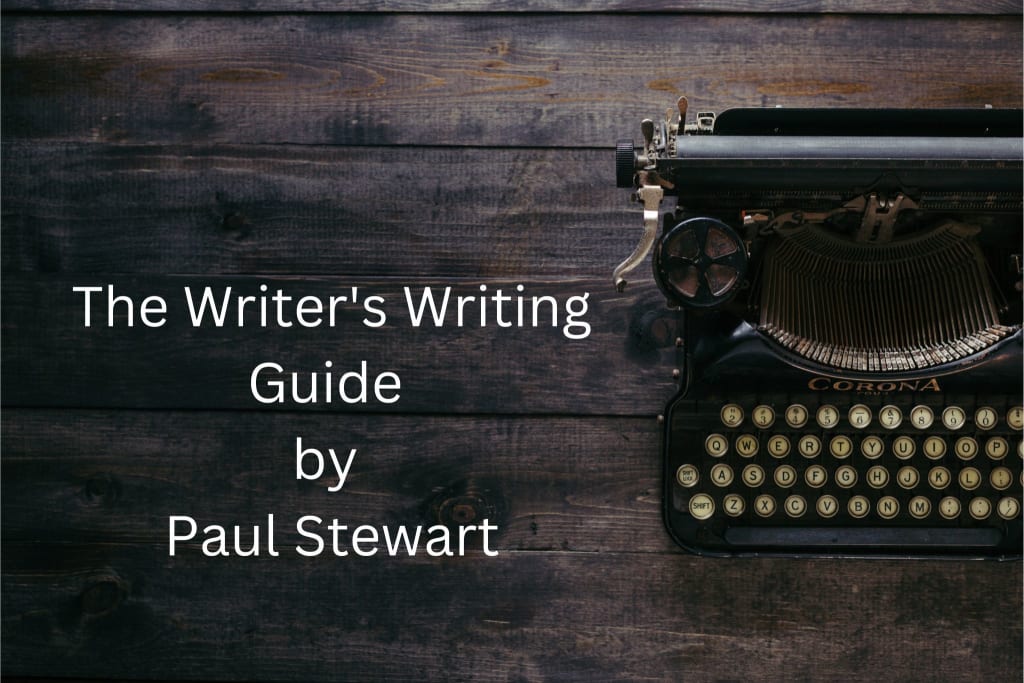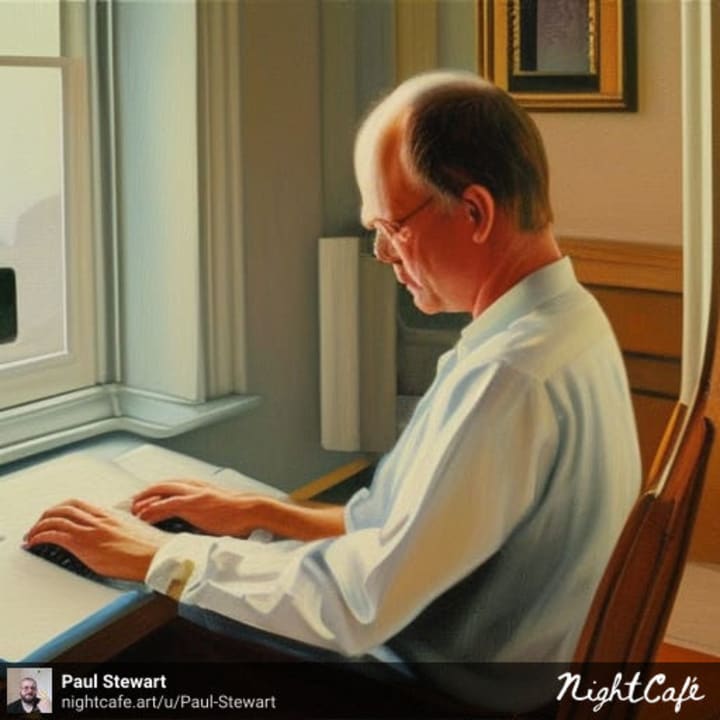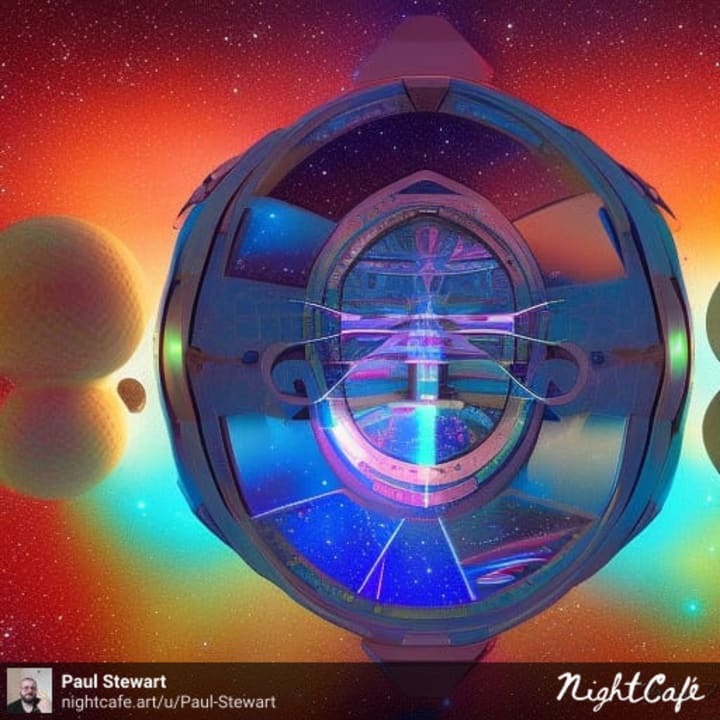The Writer's Writing Guide
By Paul Stewart, A Writer.

Recently, there have been a lot of articles and series about the writing craft. For example, Rick Henry Christopher has started a series called The Writer's Workshop with different creators. So far, he has featured Scott Wade and Stephanie Bradberry. Heather Hubler has been conducting and publishing fascinating interviews with wonderful creators in a series, titled Center Stage: Creators in the Limelight. She has so far featured Gina C., some guy called Paul Stewart, and Dean F. Hardy. While Stephanie Bradberry has been working on a masterclass that includes Introduction to Innotating Poems, How To Analyze A Haiku, and Introduction To Annotating And Analyzing Poems.
There has also been a few pieces that have emerged as responses to these pieces, such as Shane Dobbie, titled Hooptedoodle and Flim Flam and a follow-up from KJ Aartila, titled More Flim Flam From the Aquarian's Journal. So there is clearly a lot of interest in the craft we call writing.
Far be it for me to step on anyone's toes, but as someone who has worked for more than 12 years as a writer for digital marketers, website owners and others, I feel that experience is worth sharing.
This is mainly for newbie writers looking at all the great pieces on Vocal and elsewhere and wondering how to tighten their works up to be publish-worthy. However, we can all benefit from learning and improving – it's a gradual process to becoming a better writer.
You only stop learning anything worth knowing about writing when you're dead.
So…are you sitting comfortably? Good, then we will begin.
Writers Write

This may seem like an obvious statement to make but hear me out. If you are walking around calling yourself a writer and not writing, then you're not a writer. You're just a walker. You need to put pen to paper or fingers to keys or …you get the picture.
The only way you can get away with calling yourself a writer and not writing is if you are suffering from writer's block or waiting to hear from your agent about whether your big sexy novel has been accepted.
So, you want to be a writer? Get to it and write.
Your First Draft Always Sucks

This is a hard pill to swallow for any writer, but it is still true. You have that spark of an idea…you start writing on your fresh bit of A4 paper or whatever funky size you write on and think you've got the new Great Gatsby. I hate to burst your bubble, but it's unlikely to be a stone-cold classic.
So what you need to do is this is an excellent practice to get into even before you start writing anything. Take that fresh piece of paper and scrunch it into a ball and then try to score a three-pointer from your chair into the nearest bin.
No cheating, obviously.
Your Second Draft is Better But Needs Work

Again, this is something we all must face up to, but the second draft will be closer to that stone-cold classic you're trying to write but still far away enough that you can trash it. So after you've written the title or My Lovely Book or whatever, scrunch that sheet of paper, and you've guessed it, crush it and hit the trashcan.
We're getting somewhere now. It's humbling to scrunch up pieces of paper and throw them away. Shows your passion for this writing malarky.
Your Third Draft is Where it's At

This is usually the case, though don't hold me to that. It's your writing – I'm not responsible for your decisions. However, by the time you've undergone several edits and alterations, your story, poem, manuscript, novella or whatever should be shaping up nicely.
Although the last three suggestions may sound trivial, they are great lessons in humility.
Humility is vital to honest writing. Humidity is your enemy. Unless you are writing a sex scene.
But more on that later.
Tell, Don't Show
Before everyone comes at me with scythes and synths, hear me out. Contrary to what many say, show, not tell, is not always the best course. In fact, tell as much as possible.
"Remember…they are book readers, not mind readers." Paul Stewart, A Writer.
It's your job to do all the world-building and to explicitly describe stuff to them.
If you expect them to pay attention to your writing or to pay money on Amazon or wherever you are looking to flog your stuff, make it worth it.
No Such Thing As Overexplaining
Really. There is no such thing as overexplaining. That's why this point is mentioned twice in a row. If, while writing, you start to worry that you've said too much. The chances are you need to say more.
Spoon-feed your readers every little detail like they are 6-month-old babies. Paul Stewart, A Writer
If Something's Not Broken, Don't Fix It
Do you want to know why Agatha Christie and Jane Austen are so famous? They had a good formula and stuck to it. Once you find your winning formula, you need to stick to it.
There is no point in writing a wild YA fiction piece about a dog that falls in love with a human and is involved in a love triangle with a skeleton and the same human, then switching tactics and writing about a serious historical drama set in WWII.
Look at JK Rowling. She wrote several books about that wee chap with the scar that definitely wasn't a rip-off of Luke Skywalker at all.
Don't Write With a Filter
Don't write with a filter unless you find an Agatha Christie or Ernest Hemingway filter. Bare your soul. Bloody up those pages with your blood. Do not send a manuscript to a publisher covered in blood or other bodily fluids. And yes, even if it's someone else's – it's gross and too literal.
Make Dialogue Realistic
Remember what I said about your readers not being mind readers? Well, this applies when it comes to dialogue. If you think you are being all punchy and adding tension by tightening that dialogue, you're almost certainly wrong, friend.
There is a fine art in writing beautiful and realistic dialogue, true. But it's pretty easy. Just think about how the conversation between your two characters would go in real life, and then write that down in its entirety. Yes, all "uhms, erms, ohs, hmphs" and weird pregnant pauses should be kept in.
Unreliable Narrators Are Your Friend
Regardless of what genre you are writing for, you should make liberal use of the unreliable narrator in your work. Unreliable narrators are perfect for giving any story touches of "WTF". Sometimes, it helps if you forget what's happening as you write it. Then it can make for an unsettling experience.
Sex Should Be Fantastical

If you're going to do erotica…, do it right, dammit. No one wants to read about awkward, clunky sex. We want to read the most passionate and scintillating sex scenes, where every man is a stud, and every woman is a gorgeous sexual goddess. We're talking about getting down and dirty high on the back of a horse or elephant or underwater in a sinking submarine.
Punctuation is for Wimps

I will qualify my point with an example.
Dave looked out across the field before him where he could see piles and piles of freshly stacked hay that had been there overnight and had gotten soggy from the rain that had fallen during the night and the morning dew.
The above paragraph is considered by many to be poorly written because it lacks punctuation. However, I think it helps build on Dave's emotions, and, thoughts, and other important things.
Some Vagueness is Useful
Although you should want to fill in all the gaps and describe everything, it doesn't hurt to have some vagueness. This could distinguish between a reader turning onto your 34th chapter or not.
Tie All Loose Ends Up
If you find yourself nearing the end of your story, you need to tie up everything nicely so that the reader can get on with their life once they have finished your piece. Leave nothing unsaid. Nothing.
Plot Holes = Science Fiction

So, I know what you're thinking. "Paul, I'm not writing science fiction – I'm writing about the Suffragette movement". Well, good for you, but my point still stands. If you discover late in the day after you've published that there appears to be a plot hole in your story. Rather than correcting and redoing it, you should treat this as a blessing in disguise because plot holes can make any story science fiction.
If one of the characters changes from Frank to Betsy, then it could be that they've had a body swap, or one of them is a time traveller. So, rather than going to the trouble to painstakingly trace back and work out where the plot hole formed, you could make things easier and say that the story is a science fiction thing, even if it's a 15th-century romance.
Don't Read Other People's Work
You've probably heard the advice many writers like: "If you want to be a good writer, you need to be a good reader". This is not true. If you read too much, you will start ripping off the people you read. That also means you will unlearn your good writing skills and pick up their bad ones.
Please don't do it. Put the book down and step away from it. Dammit, you're a writer, not a reader.
Publish At Haste, Note a Waste, Edit At Your Leisure, To Your Displeasure
I think this speaks for itself. You can get too caught up on editing your work. Sometimes, you need to hit the publish button. Especially if we are speaking about posting your fiction, poetry, sex tips, Paul Blart: Mall Cop dissertation or your high-tech tech review on Vocal.
Your First Draft is Your Best Draft

That's right. The first draft you write of anything is the best version of anything. Yes, that means what you think it means – go over to the trashcan and get that scrunched-up piece of paper out and try and iron it or something to make it usable. If you're typing your story, you can use the recycling bin.
Fin – This is both the end and how you should end all your stories, especially if you want to come across as cultured and classy.
*
If you have reached the end of this article and are more than a little pissed off. Don't worry, as I was not being very serious. Paul Stewart, A Writer.
Also, in the interest of being fair, I never managed to fit a link to Gina C. and Dean F. Hardy's profile pages. Sorted.
I hope you enjoyed this slightly satirical look at analysing the craft we call writing. If you did, or have anything you want to say, click the heart, leave a comment or do both!
If you have some time, here are some of my most recent pieces:
You can also check out the rest of my work here.
About the Creator
Paul Stewart
Scottish-Italian poet/writer from Glasgow.
Overflowing in English language torture and word abuse.
"Every man has a sane spot somewhere" R.L Stevenson
The Accidental Poet - Poetry Collection is now available!
https://paulspoeticprints.etsy.com
Reader insights
Outstanding
Excellent work. Looking forward to reading more!
Top insights
Heartfelt and relatable
The story invoked strong personal emotions
Easy to read and follow
Well-structured & engaging content
Compelling and original writing
Creative use of language & vocab
Expert insights and opinions
Arguments were carefully researched and presented
On-point and relevant
Writing reflected the title & theme
Eye opening
Niche topic & fresh perspectives
Excellent storytelling
Original narrative & well developed characters







Comments (32)
Okay, I should have gotten the joke way sooner than I did. I had suspicions at "No such thing at over explaining" I was like, Wut? Spoon feed the audience?? Then quickly, Ohhhh... Brilliant satire. I actually think there's nuggets of advice inside it, too, like in "Tell, don't show." I think that one that really depends on what genre you're writing in and what you mean by "telling" versus "showing." I've read enough bad "showing" in novels to completely unravel this piece of advice. Really, you need a good mix. It's a healthy mix of good and bad advice, actually. Very clever, and actually, yes helpful too! I think it was worthy of TS, personally. ;D
Great list and I agree with virtually every single item! Tell not show? I went back to look at the writing of one of my favorite books, A Moveable Feast, and Hemingway just tells tells tells and explains every single character in great detail before you see them doing a single thing. I like to be told things, I think you have a good point on this one, the consensus has gone too far toward showing like every novel should be writen like the Hunger Games. I'm still undecided about commas and go back and forth about how many I'll put into a single long sentence to chop it up into smaller digestible bits. "Dammit, you're a writer, not a reader." Yes!! I thought I was the only one leaving the occasion snarky comment about only reading 2 novels a year and discovering I'm still able to write just fine..Does going to the cinema every weekend turn one into a Film Director?
Awesome read, my friend! Love the sarcasm 😅 Personally tho, I like to write on the back of flying unicorns and I only commit to reading the novels of distinguished dickalufaguses, so none of this applies to me 😃(jk) 😆 Congrats of Top Story! ❤️
Very interesting thoughts on the writing process and the writer’s life. Cool stuff here!
I hope I have a "big sexy novel" by September lol
Loved this so much! My favorite part about writing realistic dialogue is the "Umms" and "Well..." and "...Huh?" When I'm out in public, that's how people sound!
Good points and funny parts!! Great article
Lol, I love your sense of humour! Your article was very thought provoking. I usually write a first draft and keep tweaking it until it doesn't feel stupid to me, lol. The paragraph about Dave without the punctuations, I wouldn't say it's poorly written but it isn't a style that I would wanna read. Every writer has their own style and if without punctuation works for them, I respect it. I may not enjoy reading it but that doesn't mean I hate it or I'm gonna criticise it. I gotta disagree with you on not reading other's work. I'm an avid reader but I still have my own style of writing. I'm not easily influenced. That may not be the case for everyone but learning never stops and the best way is by reading. I've only tried the unreliable narrator technique for one story, The Pumpkin Killer. But I really like that technique because my genre is horror and it works well for plot twists. Anyway, I'm so sorry for my long comment, lol! Didn't realise I had so much to say. But I enjoyed reading this. I'll definitely make my dialogues more realistic with the Uhms and Ahhs.
"If you're going to do erotica…, do it right, dammit. No one wants to read about awkward, clunky sex. We want to read the most passionate and scintillating sex scenes, where every man is a stud, and every woman is a gorgeous sexual goddess." I read this and was like, "Bro, the sex where people giggle and laugh at small stupid mistakes sometimes help to make the moment, and even make the story more likeable to the reader as the characters are more relatable." Then I realized that this was satire. Hehehhhh... You had me in the several first halves, not gonna lie.
I am now terrified a fledgling writer will not pick up on the satire and really believe that punctuation is for suckers. Also that block quotes attributed to yourself is a standard practice 😉
The Onion's got nothing on you! 🤣Enjoyed your writing whimsy! Congratulations on Top Story!
So glad this is satire LOL Well played! Congrats!
Sweet!!! Congratulations too!!!💖💖💕
Paul! You totally got me, hahaha! Love a good satirical piece, and I was so damn relieved when I realised that's what this was. Congrats on a well-earned Top Story. This one will definitely garner some attention. 😄
Enjoyable read that caused me to bless my keyboard with a blurghle of Diet Coke.
Well done!! Great advice ! Congratulations on top story!
YAY!!!! Congratulations on Top Story!!!
Ahhhhh. March Madness has crossed the big pond! 😂 Fun article Paul!! 😎
Whoop, there it is!!! Congratulations on your Top Story :)
Yaaayyy! Congrats on the Top Story.
A lot of truth is said in jest, and there was some good points in this satire! I believe the first draft is the best and the worst thing you could write. I completely trash my first drafts, but if I never wrote them, I would not have a final draft.
I'm quite fond of the Neil Gaiman quote that goes something like "the art of the second draft is making it look like you knew what you were doing all along."
I was reading so many conflicting pieces of advice in this article until I realized it was meant to be satirical. Congratulations on your Top Story!
What a brilliant guide and read. I'm sure I will be referring to this at some future point. Thank you for the insight of your experience.
Hahaha this is a fantastic read. Love it Paul.